Indispensable No More? - How the American Public
Sees U.S. Foreign Policy
By Mark Hannah
November 24/25, 2019 "Information
Clearing House" - American exceptionalism
is the belief that the foreign policy of the United
States should be unconstrained by the parochial
interests or international rules which govern other
countries. Writing in The Atlantic earlier
this year, Jake Sullivan defines American
exceptionalism as the understanding that, “despite
its flaws, America possesses distinctive attributes
that can be put to work to advance both the national
interest and the larger common interest.” Not only
is the United States uniquely equipped to divine a
larger common interest, but it has the singular
opportunity to pursue and protect it.
Last year we discovered most Americans think the
United States is exceptional because of the example
it sets than for the active role it takes in world
affairs. Americans were more than twice as likely to
believe “America is exceptional because of what it
represents” than believe “America is exceptional
because of what it has done for the world.” Although
this remains true this year, the number of people
who believe America is an exceptional country
because of what it represents declined by 7 percent
since last year. Those who believe America is not an
exceptional country increased by roughly that
amount.

The rise in anti-exceptionalism was most
pronounced among younger Americans. It was the top
answer choice for respondents under 45 years old.
Fully 55 percent of those between 18 and 29 believe
the United States is not an exceptional country, as
do a plurality of Democrats, Independents, and
unaffiliated voters.

This sharp increase in the number of people
disavowing American exceptionalism and decrease in
people thinking America is exceptional for what it
represents takes place amid a backdrop of escalating
attacks on democratic institutions by the Trump
administration, and an impeachment inquiry which
highlights deep partisan divisions within Congress.
Threat Perception
Split Along Partisan Lines
Americans continue to be split along party lines
when asked about the greatest threat facing the U.S.
in the 21st century. A plurality of Democrats and
Independents are concerned with “a rise in populist
and authoritarian governments.” Republicans, on the
other hand, fear America is “losing its national
identity due to high levels of immigration.”
Democrats, Republicans, and Independents all ranked
as the second most urgent threat: “Americans
becoming distrustful of democratic institutions and
less committed to participating in civic life.”
The potential threat posed by immigration and a
loss of national identity was ranked last among
Democrats and ranked first among Republicans. These
results continue to reflect a stark contrast in how
people with different partisan identities view
different threats.
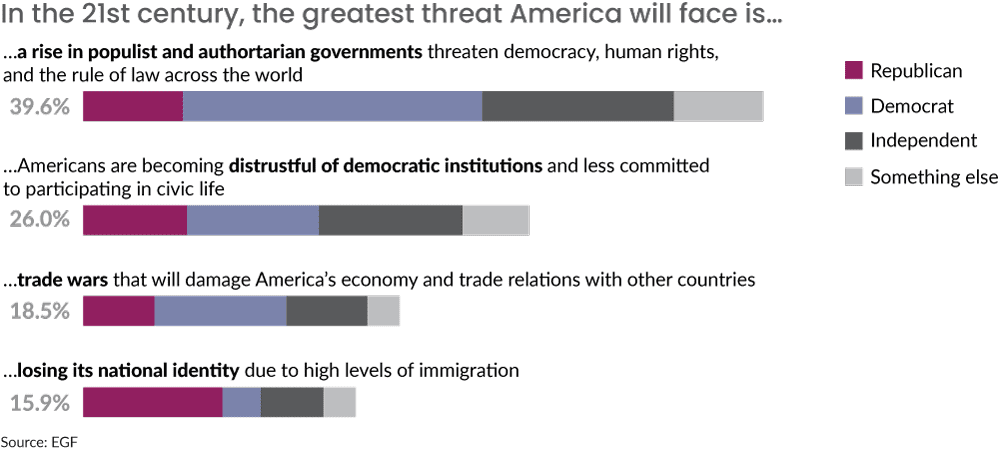
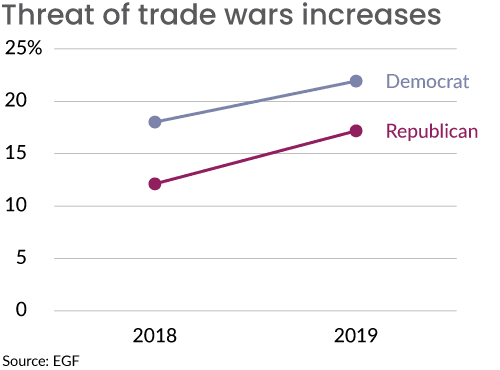
Authoritarianism and immigration aren’t the only
issues that stoke anxiety among Americans. The trade
war between the U.S. and China has Americans worried
as well. A 2019 New York Times poll shows
that Americans anticipate negative economic
consequences.3 The perceived threat of
economic damage caused by trade wars in the survey
results increased between 2018 and 2019 among both
Democrats and Republicans. It is likely the Trump
administration’s ongoing tariff disputes with China
have people across the political spectrum feeling
pessimistic and frustrated.
|
Are You Tired Of
The Lies And
Non-Stop Propaganda?
|
Peace Promotion
Bringing Democracy Home
Democratic candidates running in the 2020
presidential election argue the strength of
America’s foreign policy is linked to the strength
of American democracy. Indeed it is awkward to
promote certain democratic values abroad as America
struggles to live up to them at home.
In his prominent typology of foreign policy
worldviews, Walter Russell Mead distinguishes
between Hamiltonian, Jeffersonian, Jacksonian, and
Wilsonian types.4 Voters in the survey
prioritize the domestic needs and the health of
American democracy as a precondition to the pursuit
of international peace – what is essentially a
Jeffersonian worldview. Although it’s not an
orientation typically taken by foreign policy
professionals, Richard Haass, arguably the dean of
America’s foreign policy leadership, tapped into
this sentiment in the title of a recent book,
Foreign Policy Begins at Home. And this
sentiment becomes more widespread as politicians
begin to understand the necessity of linking the
U.S. governments’ foreign pursuits to the well-being
of everyday Americans.
As with last year, this Jeffersonian outlook was
the top choice among Republicans and Independents.
Democrats are more likely to embrace a Hamiltonian
view – that economic integration and trade best
promote peace. One notable exception to this is the
finding that Elizabeth Warren supporters align more
with Republicans and Independents in their support
for the Jeffersonian view. Somewhat surprisingly,
supporters of Bernie Sanders, who has vigorously
opposed free trade deals such as NAFTA and the TPP,
chose economic integration and free trade (a kind of
Hamiltonian view) as the best way for promoting
peace.
The Wilsonian view which grants primary
importance to the global promotion and defense of
democracy is the least popular among Republicans and
second least popular among Democrats. The least
popular among Democrats is the Jacksonian view,
which sees the threat of overwhelming military force
as the best path to peace. This view was the second
most popular, however, among Republicans (and among
Trump voters).
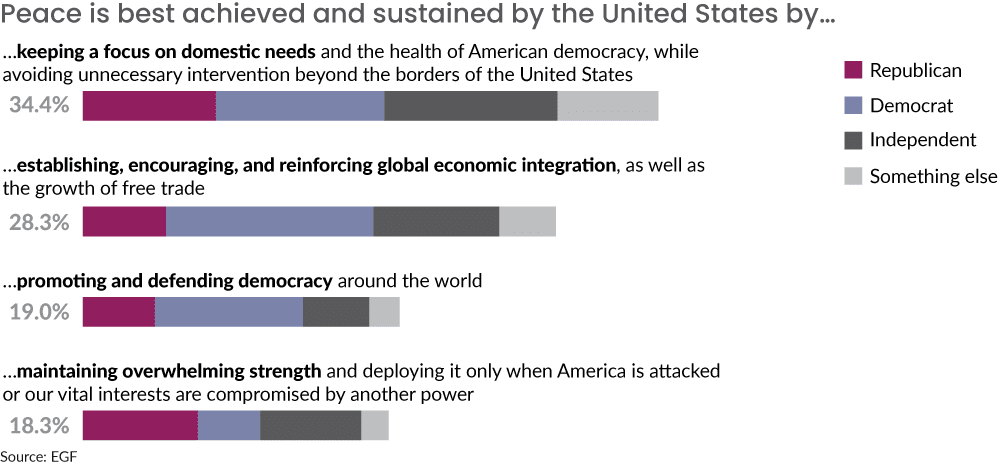

Humanitarian Intervention
Americans Still Favor Restraint
We asked respondents how the U.S. should respond
to humanitarian abuses overseas. Like last year, a
plurality of Americans – nearly half – favor
abstaining from military intervention when Americans
are not directly threatened. 5
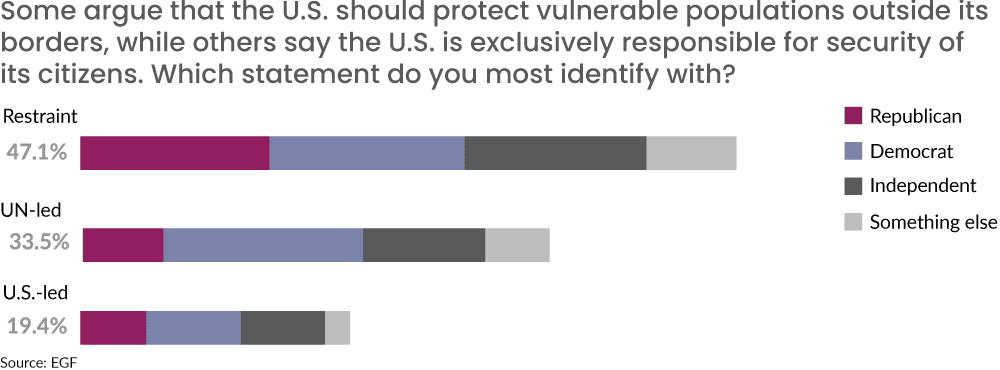
In 2018, 45 percent of Americans chose restraint
as their first choice. In 2019, that has increased
to 47 percent. Only 19 percent opt for a U.S.-led
military response and 34 percent favor a
multilateral, UN-led approach to stop humanitarian
abuses overseas.
In the past year, Democrats have become more
reluctant to respond to humanitarian abuses with
force. Last year, 26 percent of them favored a
U.S.-led military approach. This year, that dropped
to 19 percent. That 7 percent drifted primarily
toward favoring nonintervention and secondarily
toward favoring multilateral intervention.
These findings suggest Democrats are less
supportive of U.S. unilateral military action, even
in the face of a humanitarian catastrophe. Democrats
are apparently less committed to the notion that the
U.S. is obligated to defend vulnerable populations,
and that doing so improves global stability. Perhaps
Democrats better appreciate how unilateral military
action in the name of human rights can backfire, for
example, in Libya or Afghanistan. Or perhaps their
distrust of the Trump administration has eroded
their support for liberal interventionism. In any
case, restraint and multilateralism are more
attractive policy options among Democrats today.
Nonintervention is even more attractive to
Republicans, a majority of whom registered support
for it. For Republicans, a preference to abstain
from intervention in response to human rights
violations increased from 51 percent in 2018 to 56
percent in 2019. Republicans in this camp favor
restraint because they either believe the U.S. has
its own domestic or human rights problems which
America should focus on, or the U.S. should only put
American troops at risk if there is a threat to
American national security.
Defense Spending
Maintain Or Reduce The Budget
The U.S. defense budget is set to reach historic
heights, with the Trump administration proposing a
budget of $750 billion for 2020. “The United States
is expected to spend more on its military in 2020
than at any point since World War II, except for a
handful of years at the height of the Iraq War,”
according to a defense budget expert6.
Candidates in the 2020 democratic primary like Joe
Biden and Pete Buttigieg advocate increasing
America’s defense budget while Elizabeth Warren and
Bernie Sanders advocate decreasing and reevaluating
America’s military expenditure.7
Like the pool of candidates running for
president, Americans are also varied in their views
about America’s heightened defense budget. About
half of the respondents in this year’s survey
thought lawmakers should maintain the current level
of military spending, a slight increase from the 45
percent of respondents in 2018. Like last year,
twice as many of the remaining respondents preferred
decreasing rather than increasing the defense
budget.
Consistent with last year’s findings, we found
more Democrats than Republicans wanted to decrease
military spending, and more Republicans than
Democrats wanted to increase spending. However, the
majority of Republicans favor maintaining current
levels of military spending over increasing the
budget. And the most popular answer choice for
Democrats was to spend less on defense.

Maintaining current levels of military spending
is the most popular answer among all respondents. It
is also the most popular answer among supporters for
Donald Trump and Joe Biden. The majority of
Elizabeth Warren supporters and nearly half of
Bernie Sanders supporters favor decreasing military
spending. This represents not only a divide between
the right and the left on ideas about military
spending but also a divide between supporters of
Sanders and Warren and those of Biden. Democratic
candidates and their supporters may be split on the
issue of military spending as they work to build a
unified platform on foreign policy. The majority of
respondents who favor increasing the military budget
also said they would support Donald Trump in the
2020 presidential election.

We asked our survey participants why they thought
the U.S. should increase or decrease the defense
budget. The respondents chose between three possible
rationales, and the results were weighted. In 2018,
the most popular rationale for increasing military
spending related to perceptions of a weakened
military under President Obama and a wish for it to
be restored to its full strength. In 2019, the most
popular rationale had to do with increased fear of
ascendent powers like China and Russia. In contrast,
those who favor decreasing the budget, both in 2018
and 2019, believe there are greater needs at home
where America should devote its resources.
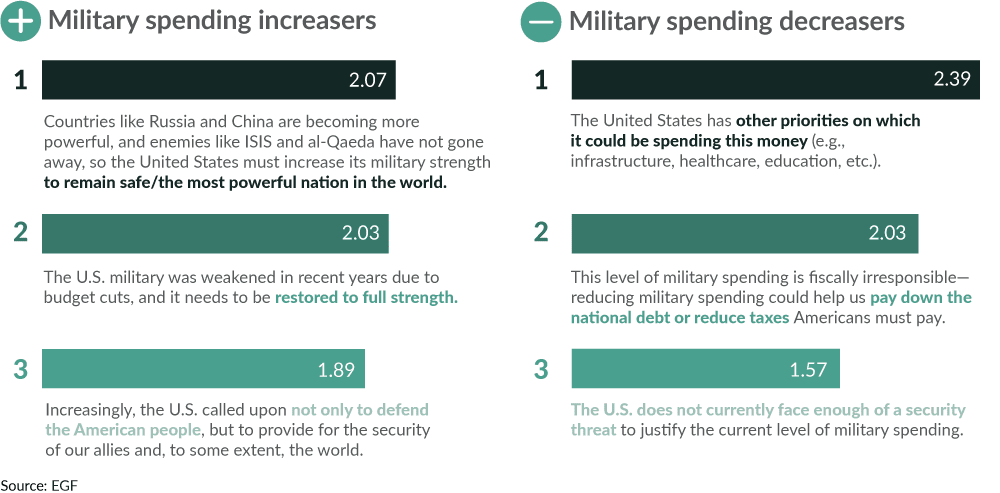
This article was originally published by "EGF"
- -
Do you agree or disagree? Post
your comment here
==See Also==
Note To ICH Community
We ask that you assist us in
dissemination of the article published by
ICH to your social media accounts and post
links to the article from other websites.
Thank you for your support.
Peace and joy